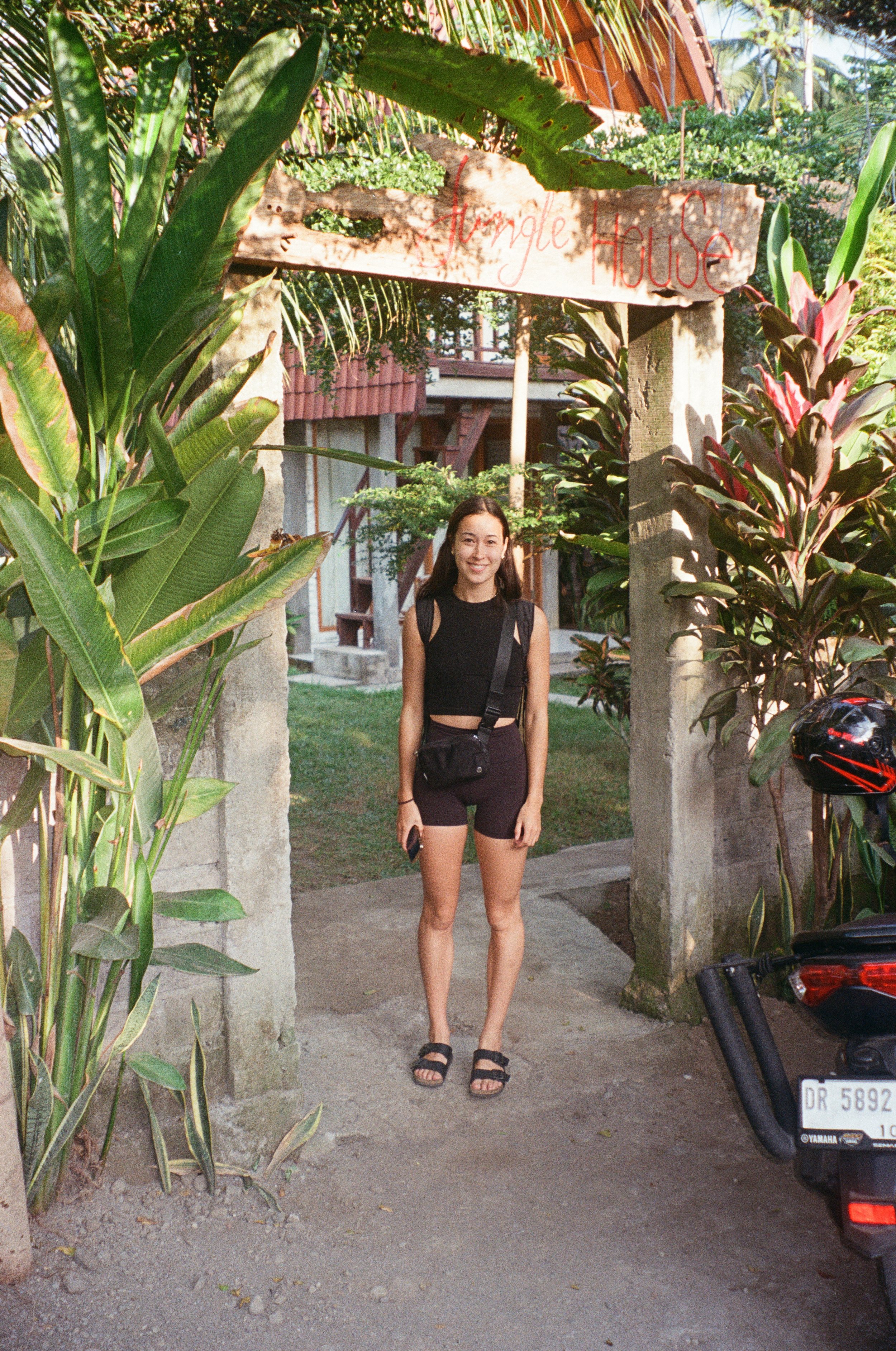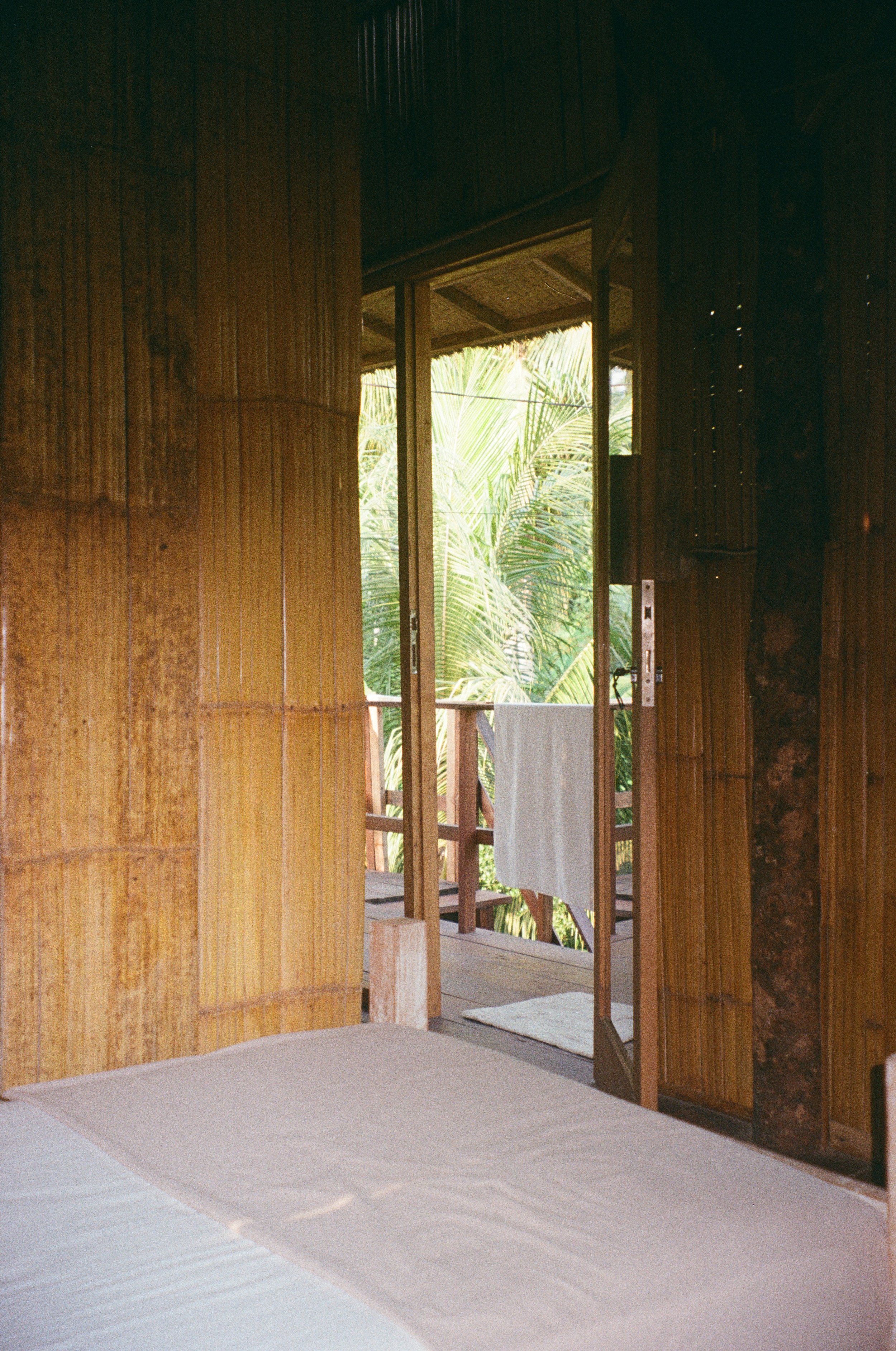Sunsick in Search of Suksma
Entry 001 | 23.6.24
Only halfway to the surf store, and I’m starting to look as bad as I feel, a cool wave of a familiar feverish sweat passing over me, the type that signifies a long twenty-four hours ahead. Under a high Indonesian sun, I’m stuck behind a pure example of the people’s will to innovate — a lime green sports bike welded to a ute tray. The sweet stench of garbage water wafts from a stack of trash, six sacks high and fastened under the weight of two smiling teens. I remember my remarks that morning. ‘Suns much harsher back home,’ I had declared, ‘don’t need sunblock; I don’t burn here’. There’s a crossroad up ahead.
Thankfully, Frankenstein’s solution to sanitation carries on through, straight down a dirt track parallel to an endless black beach. I take the right up a steep, smoothly tarmacked hill guarded either side by twenty-foot coconut palms. The store is perched on its crest, its cool air conditioning beckons, but with 400,000km on the clock my scooter will soon be ready for the welder. In my one remaining wing mirror, Memphis and Jarrod appear. I peel back the throttle and almost hit 35.
View from the hill. Medewi Beach, Bali.
Two expats are mingling in the shaded courtyard out front. Dobbo, a sun-reddened, red-headed man in a wrist cast, hails from the Waikato of all places. He met Mareike, the pleasant German lady holding an iced latte and a laptop, ‘Where all good things start.’At Old Man's Beach Club in Bali some seven years prior. They live on one side of their store; the latte is from their small cafe on the other. He skateboards steep, palm-lined hills unsuccessfully. She designs swimwear so stylish that Memphis bought a set in ‘clay’. Speaking of, Memphis and Jarrod now arrive, and with the Kiwi count at four to one, conversation degrades. We discuss pie inflation and P addiction, the How Many Weetbix Propaganda Machine and Nutrigain's dubious association with Ironman performance. And, of course, surfing:
‘No one can surf here’, exclaimed Dobbo, ‘they all get up at six-thirty. Who the fuck told them that? I go at eight-thirty when they’re all coming in for breakfast. I don't bother with the point unless it's right before sunset because everyone gets scared. Why? They’re just rocks.’
In the world of testosterone-fueled surf tribalism, it is strange and rare for an established local to divulge any real information. So I was quietly surprised when Dobbo continued. Maybe it was our accents. Or maybe the reassurance that things were less palm-lined living back home. Either way, he offered a detailed guide on how to find some spots down the coast.
‘Go down that dirt road’, he instructed, pointing toward the way we came, ‘when you see a rock, turn right.’
Here we could find a fabled right that ‘Shits on Kirra’ and another that runs the other way further down. but with the sun high and wind up, we wouldn't see either mythical wave incarnated, ‘Medewi's a wet season wave’ said our new friend.
Our home for the week, Medewi, is a relatively quiet town on Bali's west coast. During Indonesia's wet season — November to March — the prevailing winds come from the northeast, blow ‘off-shore’ from mid-morning and are typically glassed in the evening. During this delicious period that happily aligns with tourism's shoulder season, one can expect clean waves, manageable swell and negotiable lineups. We were not here in wet season.
Indonesia's dry season aligns with the southern hemisphere's winter. Storms that frequent the roaring forties create constant long-period swell, and consistent off-shore winds blow from mid-morning for many of the archipelago’s premier surf destinations. In other words, in the middle of a west coast day, in the middle of May, we would be shit out of luck. But there were waves to see with one's own eyes, and one weathered expat's blown-out break can be another fresh arrival's dream afternoon. After all, how nice was it earlier that morning? Surfing in nothing but boardshorts. A tepid 28-degree ocean. A dry-season sun beating down on my naked back.
#
By the time we got back to our accommodation — aptly named ‘Jungle House’
– I b-lined to the bathroom. Skunked and scorched, it was time to spend the next few days like many others before me in a land of non-potable water: foetaly. But I had a pair of aces over those many others — the lovely Memphis and ground-hogged Jarrod. Just last November, Jarrod had undertaken the very same responsibilities in a very similar-looking wooden hut, albeit on an island two stops southeast—Sumbawa. ‘It’s sunstroke again, you silly little boy,’ said Jarrod to my pride, ‘like last time.’ He was certain. I was certain I felt like shit—both times. Still, sunstroke would mean a more defined end in sight, and a sense of comfort grew out of familiarity, and I remained internally positive, if externally on death's door.
There are no complaints when travelling and in otherwise good health: only enjoyable experiences and less enjoyable experiences. And this a maxim worth worshipping when bedridden in a paper-walled, fan-conditioned, rural Indonesian hut.
Memphis outside Jungle House. Medewi, Bali.
Indonesia is the second most populous Muslim-majority country in the world. Across some 17,500 islands, 83.45% of its 236 million are faithful to Islam. I hadn’t known this until ignorantly late in life. I hadn’t even known the country had that many people.
Medewi is a Muslim enclave among Hindu majority Bali. Along with much of the rest of the Muslim world, Indonesian Muslims observe the adhan—five daily prayers being: Fajr (dawn but before sunrise), Dhuhr (afternoon), Asr (late afternoon), Maghrib (after sunset but before the disappearance of red twilight from the west), and Isha (nighttime). The time for each prayer is determined by the sun's position relative to local time, therefore varying daily. Simple enough, but here’s the catch: the advent of amplification. Five times daily, muezzins, or 'callers,' ascend minarets to recite, sing, wail, and cry each prayer through loudspeakers.
Calls to prayer are one of those chasms you experience when arriving in an entirely different culture. The sudden realisation you’re in ‘another world’ — the whimsical denomination lazy travel presenters and twenty-seven-year-old bloggers give to someone else’s home. But they are an extremely foreign arrangement to a foreigner from ‘another world’. But they are beautiful within the right circumstances. They are the first words uttered to a newborn or when entering a new home. They are mesmerising when drifting along the pink, sunset-scaled shoreline of a quiet fishing village or bobbing out behind rolling breakers, a chalk-white dome peering back above emerald green fronds swaying in wet-season winds. I have heard the gentle falsetto of an old muezzin glide like a falcon amongst the sandstone pillars of Cairo. I have heard the same notes, seemingly suspended in Lombok’s afternoon light, floating along cosmic belts of dust caught by the sun.
Calls are equally unattractive when you have your gut in the clutches of Iblis, a plastic bowl in your own.
View from my bed in Jungle House dormitory. Fairly luxurious compared to Sumbawa. Medewi, Bali.
And here. Here, the Fajr is far different. Medewi’s many muezzins wail all at once, their amplified cries arriving from many directions and commencing as early as 4.40am. This cacophony, coupled with a very devout rooster who resides below our hut and rises with the consistency of an Imam, makes for rather challenging conditions when sweat-slicked and stuck to a single semi-sheetless mattress, every sound seeping through bamboo, like smoke through a sieve.
And so I search for the word for thanks. Is it suksma, or am I just sick? I feel my faith for my maxim slip away with the evening light. Perhaps if I convert, my health will return. I will contemplate this when I dream. For now, my only salvation is pharmacy earplugs and a $25 eye mask from the international departure lounge. As I’m lulled back to those same crimson shorelines, my soul still belongs to the west.
I’ve lashed a white koi to the side of my fishing raft. A black koi follows with anguish, like a mother whale trailing her stolen calf. I hear her cries in the deep, ‘Prayer is better than sleep.’ The white koi flakes to nothing, its flesh and scales falling away. A rooster sits atop a crescent moon steeple. As he calls, I wake.
Those same crimson shorelines. Medewi, Bali.
Postcard #1 to parents
Halo from Bali!
First stop on our carry-on-only world tour! Westworld, AKA Canggu, the modern oligarch’s and Kremlin dodger’s playground (not that I can blame the latter). Here for two nights to stock up on supplies. Yet, premium board shorts are now $180! What a world. For now, I have just a single pair of shorts. Jarrod the same. Memphis better prepared. Medewi for 6 days. World-class right-handed point break and somewhat less-frequented surf destination. Break still busy. The Raglan of Bali. Very relaxed, besides 4.40am calls to prayer. Very cheap. $14/night at aptly named ‘Jungle House’. Could live here. Next stop, LMBK!
Love, L xx
Links & EXTRAS
Surfshop owned by our new guide and friends: @getwetsurfwear and Memphis’ cute new swimsuit
Our accommodation: Jungle House, Medewi
Memphis Book Club: (three down in six days): Trent Dalton - ‘Lola in the Mirror—“I think that’s the best book I’ve ever read.”
Essential travel purchase(s): I initially thought the blackout sleep mask extravagant. It’s actually essential, and if I could go back, I would probably opt for the $35 model for added comfort. My pharmacy-bought glue earplugs are nearly melting in the heat. I’ve lost one, so I am hybridising with a neon green foam plug stuck to half a glue one—Frankenstein’s solution to roosters.
Some resources I used:
World Population Review figures
An Indonesian News Agency article which suggests the WPR figures may not have been updated
Design and symbolism of the mosque by BBC
Glossary
Kirra: A Gold Coast beachside neighbourhood, home to the world-famous right-handed point break ‘Kirra Point’.
Right-hander/Left-hander: A ‘right’ breaks from left to right from the surfer’s perspective. A left…
Period: The time between two consecutive wave crests. 1-5 seconds is indicative of local wind swells and disordered conditions. 13+ second periods are generated by ‘groundswell’, a long-period group of waves created by storm systems in the high seas.
Glassed/Glassy: The silk-like texture the ocean’s surface adorns when winds are light.
Off-shores: Winds blowing from land to sea, holding up and smoothing the wave face. Typically, easterlies on the West Coast. Westerlies in the East. Some variation for coves, points and other elements of coastal geography.On-shores: Winds blowing from sea to land, making for messy, whitewash-heavy conditions.
Skunked: When you have a bad surf and catch little or no waves. Often, when the conditions are worse than expected, the swell is smaller than forecasted/non-existent. This phrase takes on particular weight when lengthy travel to surf is involved. ‘Scoring’ is the opposite.
Minaret: A tall, slender tower, typically part of a mosque, with a balcony from which a muezzin calls Muslims to prayer. The call to prayer begins with ‘Allahu Akbar’, meaning ‘Allah (God) is greater/ [the] greatest’. Now, recordings are used more than the traditional method of a man (known as the muezzin) climbing to the tower to call Muslims to worship.



